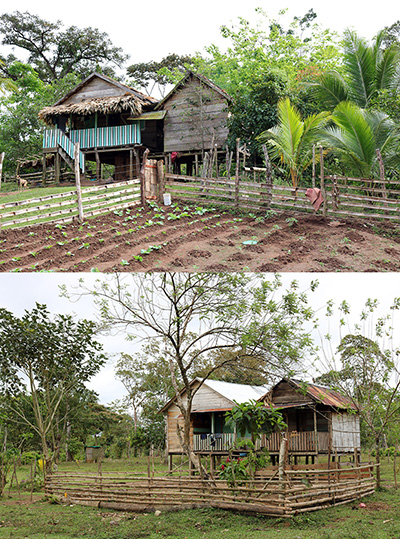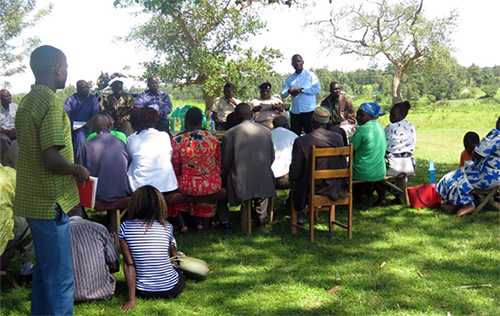
Top: the garden at the home of a community volunteer in Nicaragua. Bottom: the garden that one of his neighbors was inspired to build after seeing the volunteer’s success.
I don’t know about you, but I certainly spend a lot of time reading reviews. I check Rotten Tomatoes before I head to a movie theater. I cruise through Yelp when I’m trying to make dinner plans. And you bet I’m reading product reviews on Amazon before adding something to my cart.
But if I get a recommendation from someone I know and trust, that’s SO much better than all those online reviews. And bonus points if that person tailors their recommendation to me, personally.
Mention my favorite food when you’re telling me about a restaurant you just found? I’m in.
Talk about how the newest blockbuster is like my favorite movie franchise? I’m sold.
Recommend a clothing brand because it’s like what I already wear? DONE.
The advice of a trusted friend or a neighbor can mean a lot. And I’m not alone.
Around the world, CWS programs use the same principles to help entire communities on their journey out of poverty.
A couple of years ago, I visited a CWS-supported program in Nicaragua, along the river that forms the border with Honduras. Our team and partners there focus on giving farmers spaces to learn and practice new ways to grow vegetable gardens that will flourish in the local climate. Each community sends a few volunteers to the learning centers. They participate in classes and demonstrations and help maintain the test plots where they experiment with different ways of growing crops. Then they share what they learn with at least two of their neighbors.
We passed some of these volunteers’ homes and saw the tidy, fenced gardens that they had constructed as a result of what they had picked up at the learning centers. But we saw other homes with similar gardens, too. These families had seen the success that their neighbors were having, and they decided to do the same thing, too. The volunteers were there to help with advice and encouragement.

Chris Njugu, seen here speaking to farmers, is a community champion in Kenya. With his help, we have reached out to 185 farmers and counting to join the sweet potato program.
In Kenya, we’re helping about 1,500 families grow and sell sweet potatoes to improve their families’ nutrition and earn extra income. When I first learned about this, it seemed like a lot of families. These farmers could fill half a dozen movie theaters, so how do you make sure they all get the information and attention they need to really succeed?
It turns out that we rely on the same model of having expert neighbors who support one another. There are 50 community groups participating in this program. Each group has about 30 members who look to a lead farmer for guidance and expertise. We look for lead farmer volunteers who are already using a lot of the techniques that the program promotes and who are willing to share their skills and experience with others. Then they guide their neighbors through the information sessions on producing, consuming and marketing sweet potatoes. The lead farmers work closely with the CWS program team and always have access to a technical expert to provide advice and support. Not only is this a cost-effective way to support entire communities, but it also builds skills and expertise locally that will last long after the official program concludes.
I’ll give you one more example, this time from Myanmar. One focus of our work there is ensuring that parents can help their little ones grow up healthy and strong. Good nutrition and hygiene habits often enable families to spend less time making the long journey to health centers and less money on medication. We work with a few volunteers from each community to accomplish this goal. These women learn about different food groups and their nutritional value, good hygiene practices during meal prep, monitoring children’s weight, and the benefits of breastfeeding. They also learn the basics of facilitating meetings.
Then the volunteers become champions for child nutrition in their communities. They organize monthly sessions for other parents where they share what they learn, lead cooking demonstrations using local ingredients and monitor children’s growth. Our team is happy to coach them and help them feel supported, but these women are at the forefront of improving their communities’ health for generations to come.
The road out of poverty is often a long one, and it looks different depending on where you are in the world. But no matter where you live, the advice and encouragement of someone who really understands what you’re going through can make a huge difference. Local leaders and local solutions: these are the key to building a world where there is enough for all.
Laura Curkendall is the Director of Program Communications at CWS.

